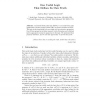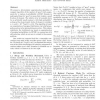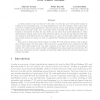109 search results - page 1 / 22 » One useful logic that defines its own truth |
CORR
2008
Springer
13 years 5 months ago
2008
Springer
Existential fixed point logic (EFPL) is a natural fit for some applications, and the purpose of this talk is to attract attention to EFPL. The logic is also interesting in its own ...
DESRIST
2009
Springer
13 years 10 months ago
2009
Springer
Design has evolved from a craft into an academic discipline, but it still falls short on defining its own science. I review previous approaches to Design Science and conclude that...
CORR
2006
Springer
13 years 5 months ago
2006
Springer
We present a deterministic approximation algorithm to compute logarithm of the number of `good' truth assignments for a random k-satisfiability (k-SAT) formula in polynomial ...
CORR
2006
Springer
13 years 5 months ago
2006
Springer
We show that it is equivalent, for certain sets of finite graphs, to be definable in CMS (counting monadic second-order, a natural extension of monoadic second-order logic), and t...
CSL
2004
Springer
13 years 10 months ago
2004
Springer
Locality notions in logic say that the truth value of a formula can be determined locally, by looking at the isomorphism type of a small neighborhood of its free variables. Such n...



